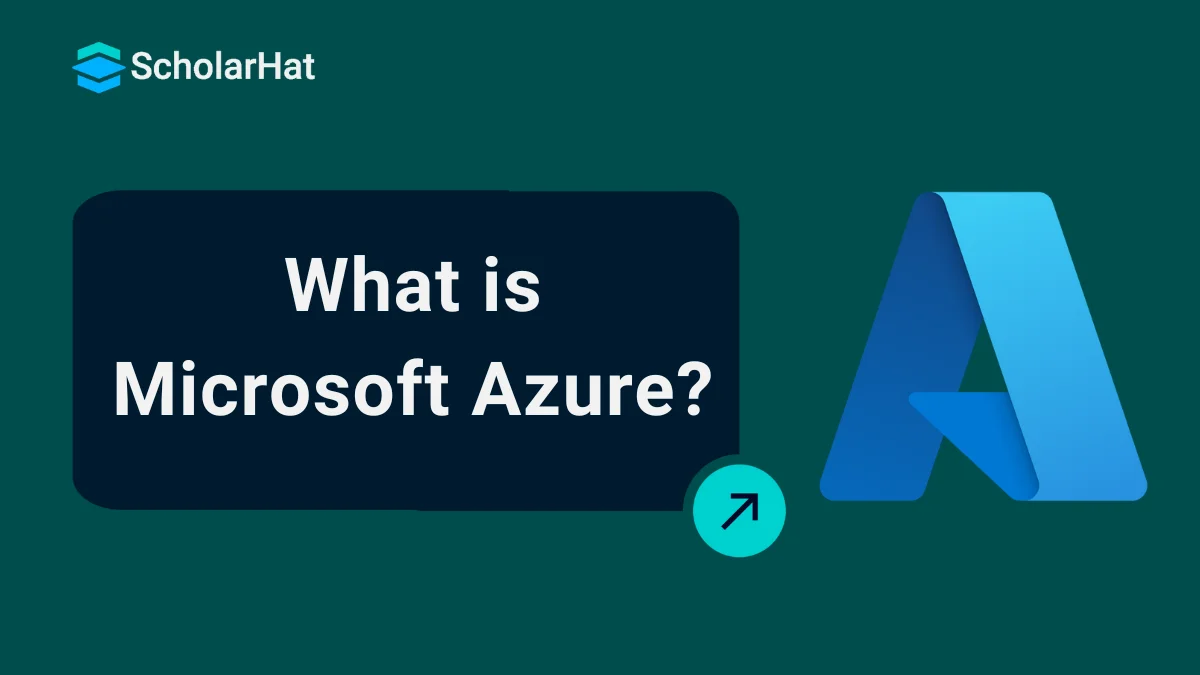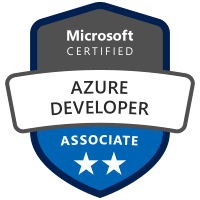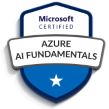30
JanWhat is Microsoft Azure? - An Introduction to Azure
What is Microsoft Azure?
Microsoft Azure is an open and flexible cloud platform that serves as the development, data storing, service hosting, and service management environment. Microsoft Azure provides developers with on-demand computing and storage to host, scale, and manage web applications on the Internet through Microsoft data centers.
By 2027, 70% of tech recruiters will prioritize Azure skills. Get certified with our Free Microsoft Azure Fundamentals Online Training today!
How does Microsoft Azure work?
Think of Microsoft Azure as your secret superhero for building apps and websites or managing data. It does the heavy lifting so you can focus on your ideas. Here’s how it works:
- A global powerhouse: Azure connects you to its massive network of servers worldwide, ready to store, process, and manage your data.
- Tools on demand: Whether you need to build a web app, analyze data, or host a game, Azure gives you the tools instantly—no setup required.
- Pay as you grow: Start small and scale up as your project grows. You only pay for the time and resources you use.
- Always reliable: Azure ensures your apps stay online, with built-in security and 24/7 support.
Why do we need Microsoft Azure?
We need Microsoft Azure because it makes building, running, and scaling applications or services easier, faster, and more efficient. Here’s why:
- No Hardware Hassles: You don’t need to buy or maintain expensive servers—Azure provides all the computing power you need over the internet.
- Cost-Effective: With Azure's pay-as-you-go model, you only pay for the services you use, saving money compared to traditional setups.
- Scalability: Whether you’re a startup or a big enterprise, Azure lets you scale your resources up or down instantly to handle changing demands.
- Global Availability: Azure operates data centers worldwide, so you can deploy your services closer to your customers for faster performance.
- Built-In Security: It provides advanced tools to protect your data and applications, keeping them safe from cyber threats.
In short, Azure simplifies complex IT tasks and empowers businesses, developers, and organizations to innovate without worrying about infrastructure!
What is a Public Cloud?
A Public Cloud is a type of cloud computing where services like storage, computing power, and applications are offered to anyone over the internet by a third-party provider, such as Microsoft Azure, AWS, or Google Cloud.
Here’s what makes it unique:
- Open to Everyone: It’s available to individuals, businesses, or anyone who needs cloud services.
- Pay-As-You-Go: You pay only for what you use, like renting space or resources.
- Shared Infrastructure: The cloud provider owns and manages the servers, and multiple users (or organizations) share the same hardware securely.
- Global Accessibility: Public cloud services can be accessed from anywhere, as long as you have an internet connection.
It’s ideal for businesses or developers who want flexibility, scalability, and cost-effectiveness without owning physical infrastructure.
Microsoft Azure Portals
Classic Portal
Microsoft has started the cloud services offering through its classic portal, which is also known as the ASM (Azure Service Management) portal. Using this portal, you can see, manage, and buy the cloud services offered by Microsoft Azure.
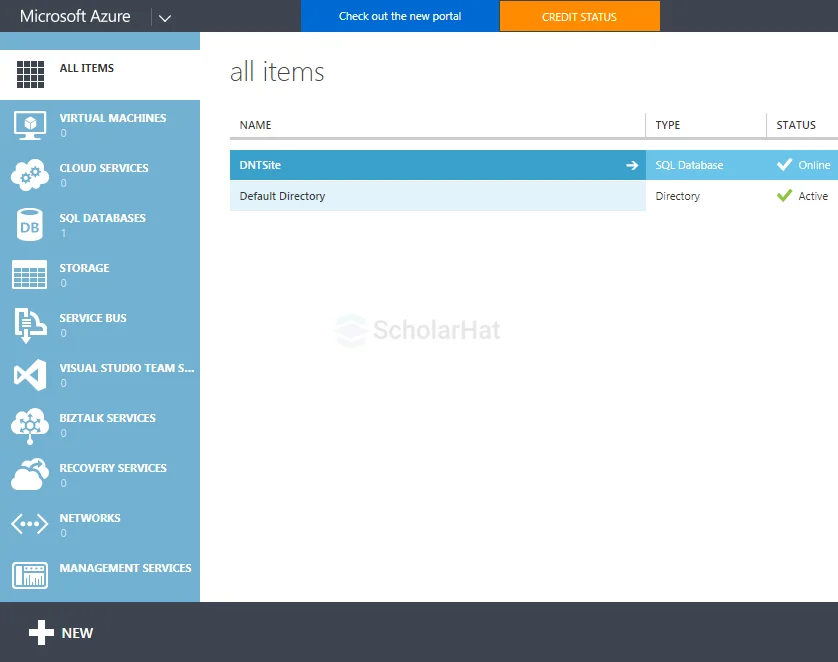
New Azure Portal
The new portal was released by the Microsoft Azure team in 2014, which is also known as the Azure Resource Manager (ARM) portal. The new portal enables you to build, manage, and monitor your cloud services in a single, unified console. This is especially useful for enterprise-level applications that have complex deployments with resources in multiple subscriptions.
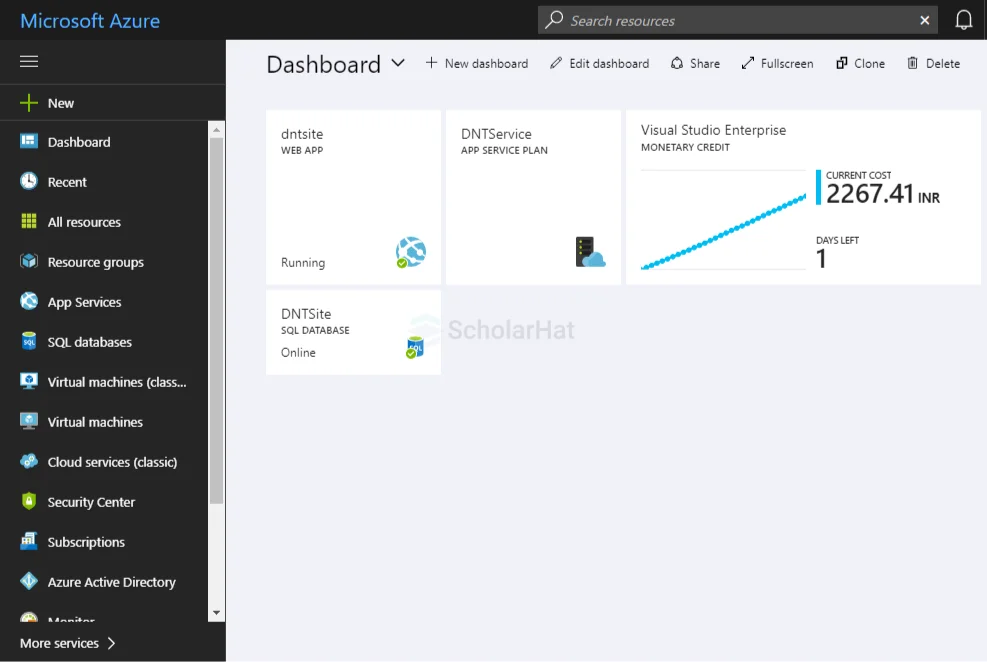
Microsoft Azure Open Source Support
Microsoft Azure helps you to build and manage enterprise-level web, mobile, and IoT apps faster using your existing skills and technologies you know. It even supports all the most popular open sources available around the world.
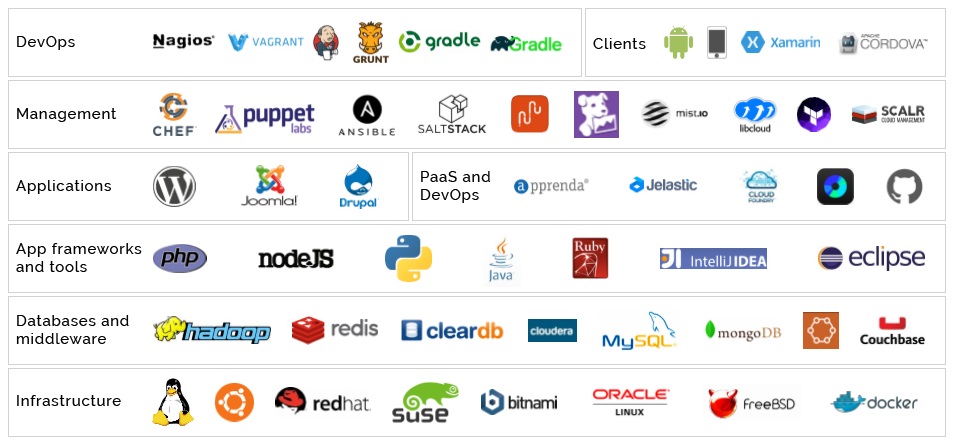
Microsoft Azure Momentum
Nowadays, Microsoft Azure is the first choice of various organizations as their public cloud provider over Amazon Web Services (AWS).

Microsoft Azure Services
Microsoft Azure offers so many Azure services through its cloud computing platform. Some of them are listed in the fig.
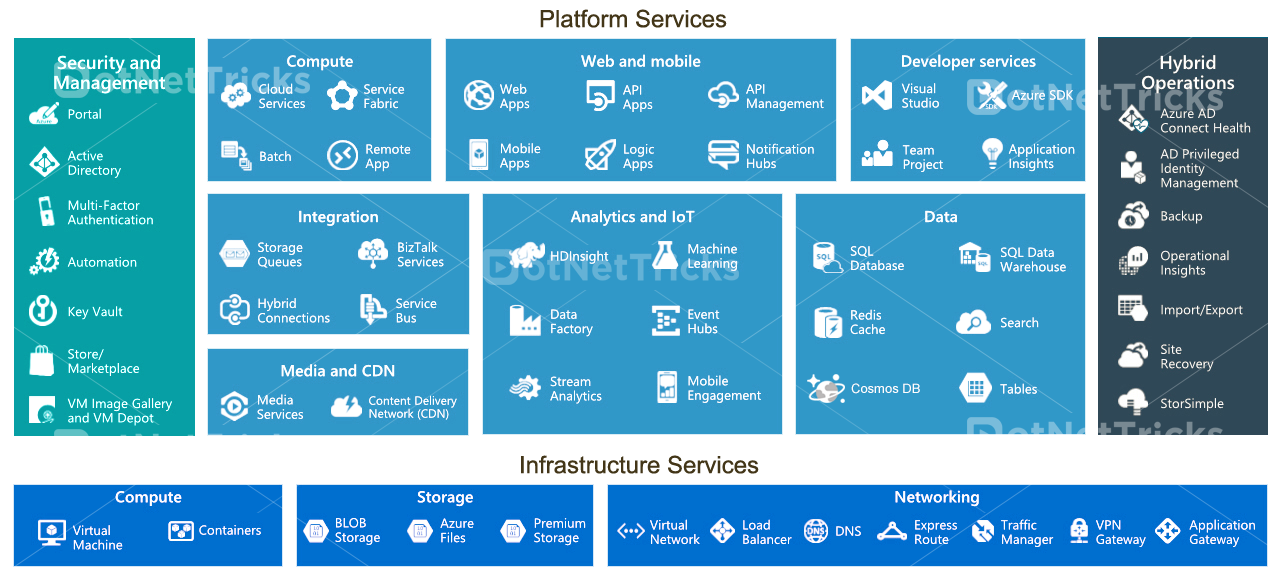
Compute Services in Azure
Compute services are used for cloud computing operations like app building, hosting and deployment in Azure Platform.
1. Virtual Machine
Azure Virtual Machine allows you to deploy any app, language, and operating system (Windows, Linux, and Ubuntu) virtually on a machine.
2. Virtual Machine Scale Sets
Virtual Machine Scale Sets allow you to create thousands of identical, auto-scaling Windows or Linux virtual machines in minutes.
3. Azure Container Service
Azure Container Service allows you to create a container hosting solution optimized for Azure. It can be used to scale and orchestrate applications using DC/OS, Docker Swarm, or Kube Azure Compute Services.
4. Azure Container Registry
Store and manage container images across all types of Azure deployments.
5. Batch
Batch allows you to run large-scale parallel and high-performance computing applications efficiently in the cloud. It can be Scaled to tens, hundreds, or thousands of virtual machines.
6. Functions
Azure Functions is a serverless compute service which allows you to run code on-demand regardless of infrastructure and provisioning of servers. Use Azure Functions to run a script or piece of code in response to a variety of events.
7. Service Fabric
Service Fabric simplifies microservice-based application development and lifecycle management. It delivers low-latency performance and efficiency at a massive scale.
8. Cloud Services
Cloud Services allows you to deploy highly available, massively scalable applications and APIs. Cloud Services support the deployment of Java, Node.js, PHP, Python, .NET, and Ruby.
Azure Networking
Azure Networking allows you to connect privately and securely to the Cloud with Azure ExpressRoute and distribute user traffic to specific endpoints with Azure Traffic Manager.
1. Virtual Network
Azure Virtual Network performs network isolation and segmentation. Filter and Route network traffic.
2. Load Balancer
Azure Load Balancer delivers high availability and network performance to your applications. Load balance incoming Internet traffic to Virtual Machines. Forward external traffic to a specific virtual machine.
3. Application Gateway
It is a dedicated virtual appliance providing an Application Delivery Controller (ADC) as a service. Comprised of multiple worker instances for scalability and high availability Azure Networking Services.
4. VPN Gateway
A type of virtual network gateway that sends encrypted traffic across a public connection. Use VPN gateways to send traffic between Azure virtual networks over the Microsoft network.
5. Content Delivery Network (CDN)
CDN caches static web content at strategically placed locations to provide maximum throughput for delivering content to users.
6. Azure DNS
DNS is responsible for translating a website or service name to its IP address. Azure DNS is a hosting service for DNS domains, providing name resolution using Microsoft Azure infrastructure Azure Networking Services.
7. Azure Traffic Manager
Allows you to control the distribution of user traffic for service endpoints such as, Azure VMs, Web Apps, and cloud services in different Data centers.
8. Express Route
Lets you extend your on-premises networks into the Microsoft cloud over a dedicated private connection facilitated by a connectivity provider. Establish connections to Microsoft cloud services, such as Microsoft Azure, Office 365, and CRM Online Azure Networking Services.
Azure Storage Services
Azure Storage Services provides cloud storage solutions for modern applications that rely on durability, availability, and scalability to meet the needs of their customers.
1. Blob Storage
Azure Blob storage is a service that stores unstructured data in the cloud as objects/blobs. It can store any type of text or binary data, such as a document, media file, or application installer.
2. Queue Storage
Azure Queue storage provides cloud messaging between application components. Queue storage delivers asynchronous messaging for communication between application components.
3. Table Storage
Azure Table storage is a service that stores semi-structured NoSQL data in the cloud, providing a key/attribute store with a schema-less design.
4. File Storage
Offers file shares in the cloud using the standard Server Message Block (SMB) Protocol. With Azure File storage, you can migrate legacy applications that rely on file shares to Azure quickly and without costly rewrites Azure Storage Services.
Web + Mobile Services
1. Web Apps
Azure Web Apps enables you to build and host websites in the programming language of your choice without managing infrastructure.
2. Mobile Apps
Mobile Apps in Azure App Service offer a highly scalable, globally available mobile application development platform for Enterprise Developers and System Integrators.
3. API Apps
API apps in Azure App Service offer features that make it easier to develop, host, and consume APIs in the cloud and on-premises Web + Mobile Services.
4. Notification Hubs
Azure Notification Hubs provide an easy-to-use, multi-platform, scaled-out push engine.
5. Logic Apps
Azure Logic Apps provide a way to simplify and implement scalable integrations and workflows in the cloud. It provides a visual designer to model and automate your process as a series of steps known as a workflow.
6. Azure Search
Azure Search is a cloud search-as-a-service solution that delegates server and infrastructure management to Microsoft. Leaves you with a ready-to-use service that you can populate with your data and then use to add a search to your web or mobile application.
7. Event Hubs
Azure Event Hubs is a highly scalable data streaming platform capable of ingesting millions of events per second. Data sent to an event hub can be transformed and stored using any real-time analytics provider or batching/storage adapters Web + Mobile Services.
Azure Database Services
1. SQL Database
Azure SQL Database is a relational database service in the Microsoft Cloud based on the market-leading Microsoft SQL Server engine.
2. DocumentDB
DocumentDB is a fully managed NoSQL database service built for fast and predictable performance, high availability, elastic scaling, global distribution, and ease of development.
3. Redis Cache
Managed by Microsoft. It is a secure and dedicated Redis cache, which is an advanced key-value store where keys can contain data structures such as strings, hashes, lists, sets, and sorted sets.
4. SQL Database
Azure SQL Database is a relational database service in the Microsoft Cloud based on the market-leading Microsoft SQL Server engine.
Enterprise Integration Services
1. Service Bus
Microsoft Azure Service Bus is a reliable information delivery service that is a brokered or third-party communication mechanism. The Service Relay service supports traditional one-way messaging, request/response messaging, and peer-to-peer messaging.
2. SQL Server Stretch Database
Stretch Database migrates your cold data transparently and securely to the Microsoft Azure cloud. Stretch Database targets transactional databases with large amounts of cold data, typically stored in a small number of tables.
Security + Identity Services
1. Key Vault
Azure Key Vault helps safeguard cryptographic keys and secrets used by cloud applications and services and streamlines the key management process.
2. Azure Active Directory
Azure Active Directory (Azure AD) is Microsoft’s multi-tenant cloud-based directory and identity management service, including multi-factor authentication, device registration, etc.
3. Azure AD B2C
Azure Active Directory B2C is a comprehensive cloud identity management solution for your consumer-facing web and mobile applications. It is a highly available global service that scales to hundreds of millions of consumer identities.
4. Azure AD Domain Services
Azure AD Domain Services provides managed domain services such as, domain join, group policy, LDAP, Kerberos/NTLM authentication that are fully compatible with Windows Server Active Directory.
5. Multi-Factor Authentication
Azure Multi-Factor Authentication (MFA) is Microsoft's two-step verification solution which helps safeguard access to data and applications while meeting user demand for a simple sign-in process.
Monitoring + Management Services
1. Microsoft Azure Portal
Build, manage, and monitor everything from simple web apps to complex cloud applications in a single, unified console.
2. Azure Resource Manager
Azure Resource Manager enables you to repeatedly deploy your app and have confidence your resources are deployed in a consistent state. Azure Resource Manager makes it easy for you to manage and visualize resources in your app. With Azure Resource Manager, you can control who in your organization can perform actions on the resources.
3. Automation
Microsoft Azure Automation provides a way to automate the manual, long-running, error-prone, and frequently repeated tasks that are commonly performed in a cloud and enterprise environment. You can automate processes using runbooks or automate configuration management using Desired State Configuration.
Competition of Azure
Microsoft Azure faces strong competition from other leading cloud platforms that provide similar services. Here are its top competitors:
1. Amazon Web Services (AWS):
- The biggest competitor and the current leader in the cloud market.
- Offers a massive range of services, including computing, storage, machine learning, and IoT.
- Known for its flexibility, scalability, and broad global reach.
2. Google Cloud Platform (GCP):
- Known for its expertise in data analytics, artificial intelligence (AI), and machine learning.
- Strong integration with Google products like Workspace and Kubernetes.
- Popular for its BigQuery and data-handling capabilities.
3. IBM Cloud:
- Focuses on enterprise solutions and hybrid cloud setups.
- Offers strong AI integration with IBM Watson and mainframe support.
- Popular for industries with legacy systems like banking and finance.
4. Oracle Cloud Infrastructure (OCI):
- Best suited for businesses running Oracle applications and databases.
- Offers strong performance for high-volume transaction workloads.
- Gaining popularity for database and enterprise applications.
5. Alibaba Cloud:
- Dominates the Asian cloud market and has a growing global presence.
- Focuses on e-commerce solutions, AI, and big data.
- Highly competitive in terms of pricing.
6. Salesforce Cloud:
- Focuses on customer relationship management (CRM) and marketing solutions.
- Strong competitor in SaaS (Software as a Service) offerings.
7. Azure’s Strengths Over Competitors:
- Deep integration with Microsoft tools like Office 365, Teams, and Dynamics 365.
- Hybrid cloud capabilities with Azure Arc for seamless on-premises and cloud integration.
- Advanced AI and machine learning tools, including Azure OpenAI Service.
- Extensive enterprise and developer-friendly solutions.
What is Azure Security?
Azure Security refers to the set of tools, practices, and policies that ensure the safety of data, applications, and services within the Microsoft Azure cloud environment. It helps protect against cyber threats, data breaches, and unauthorized access.
- Identity and Access Management: Azure Active Directory controls who can access your resources, ensuring only authorized users get in.
- Data Encryption: Your data is encrypted both when stored and during transfer, keeping it safe from prying eyes.
- Network Protection: Tools like firewalls and security groups protect your cloud network from unauthorized access.
- Continuous Monitoring: Azure monitors your environment for threats and vulnerabilities, sending alerts when something’s wrong.
- Compliance: Azure meets global security standards to help you stay compliant with privacy and data protection laws.
What is Azure Security Centre?
Azure Security Center is a unified security management system that helps you monitor, assess, and protect your Azure resources. It provides real-time security monitoring and recommendations to keep your cloud environment secure.
Here’s how it works:
- Threat Detection: It continuously scans your Azure resources for potential security threats and vulnerabilities.
- Security Recommendations: Based on the scans, it provides actionable security recommendations to strengthen your setup.
- Security Alerts: It sends real-time alerts if it detects any suspicious activity or breaches.
- Compliance Tracking: Azure Security Center helps you stay compliant with various industry standards and regulations.
- Integrated Protection: It integrates with other Azure services like Azure Defender to protect against specific threats, such as malware or data breaches.
In short, Azure Security Center is like a security guard for your Azure resources, making sure they are safe and compliant.
Best Practices for Azure Security
Here are some simple Azure security best practices to keep your cloud environment safe:
- Enable Multi-Factor Authentication (MFA): Always turn on MFA to add an extra layer of protection for your accounts and prevent unauthorized access.
- Give Access Only When Necessary: Stick to the principle of least privilege—only give users and services the access they absolutely need.
- Encrypt Your Data: Make sure your sensitive data is encrypted, both when it’s stored and while being transferred, to keep it safe.
- Keep an Eye on Your Resources: Use tools like Azure Security Center to monitor your environment regularly and catch potential threats early.
- Update Your Systems: Regularly apply security updates and patches to fix vulnerabilities and keep your systems secure.
- Back-Up Your Data: Don’t forget to back up your important data so you can recover it in case of an attack or disaster.
- Secure Your Network: Use firewalls and private networks to protect your cloud infrastructure from unwanted access.
- Stay Compliant: Make sure your environment meets the latest security standards and regulations to stay on top of security best practices.
Microsoft Azure Architecture
Microsoft Azure Architecture is the process and principles associated with developing and designing cloud-based Azure Services on Mircosoft's Azure platform. It assures that your applications and services are built on a secure, scalable, and cost-effective foundation. To keep up with demand, Azure Architecture is followed by Azure virtualized hardware, virtualized networks, and applications. This architecture relies on Software-Defined Networking (SDN).
This architecture follows the initial design stages, utilizing core components and ongoing management of your cloud solution on Azure. Microsoft offers pre-built architecture for standard plots to help you create your project. Here is the Microsoft Azure Architecture Diagram:
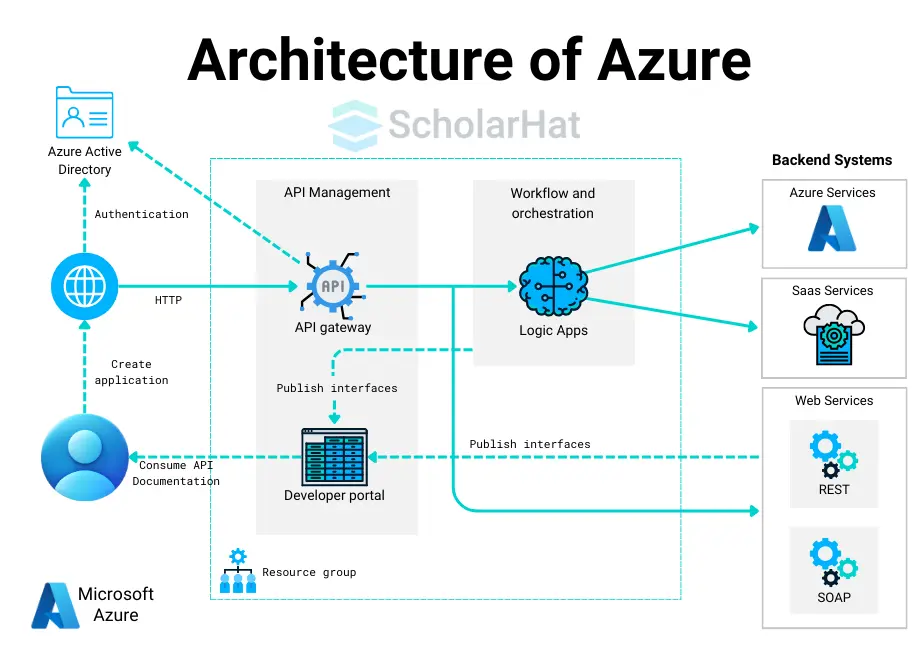
What is Azure Cloud Shell?
Azure Cloud Shell is a browser-based command-line tool that lets you manage your Azure resources without installing anything on your computer.
Here’s why it’s useful:
- Ready to Use: It comes pre-loaded with Azure CLI, PowerShell, and other tools, so you can start working right away.
- Access Anywhere: You can access it from any device with a browser, making it super convenient.
- Persistent Storage: It provides 5GB of storage to save your scripts and files, so they’re available the next time you log in.
- No Setup Required: Just log in and start managing your Azure resources directly from the cloud.
In short, Azure Cloud Shell lets you manage your Azure environment easily, wherever you are!
What do you think?
Thank you for your time; I hope you enjoyed this article and found it useful. Please add your comments and questions below. I would like to have feedback from my blog readers. Your valuable feedback, questions, or comments about this article are always welcome.
Microsoft Azure Developer Certification holders earn up to ₹12 LPA. Secure your future with our Microsoft Azure Developer Certification Course now.
Practice with the following MCQ Questions
Q 1: Which of the following is NOT a service provided by Microsoft Azure?
Explanation: Microsoft Azure provides cloud computing services like Azure Compute, Blob Storage, and SQL Database, but Visual Studio is an IDE and not a cloud service offered by Azure.
Q 2: What is Azure Active Directory used for?
Explanation: Azure Active Directory (Azure AD) is a cloud-based identity and access management service used to manage user identities and control access to resources in Azure.
Q 3: What does the Azure Service Fabric primarily provide?
Explanation: Azure Service Fabric is a distributed systems platform that helps in building, deploying, and managing scalable and reliable microservices-based applications.
Q 4: Which of the following is a key benefit of using Azure Virtual Machines?
Explanation: Azure Virtual Machines offer on-demand infrastructure provisioning, allowing users to run Windows or Linux VMs without the need for physical hardware.
Q 5: What does Azure Blob Storage primarily store?
Explanation: Azure Blob Storage is used to store unstructured data such as files, objects, and media files, providing scalable cloud storage for large amounts of data.
Take our Azure skill challenge to evaluate yourself!

In less than 5 minutes, with our skill challenge, you can identify your knowledge gaps and strengths in a given skill.

